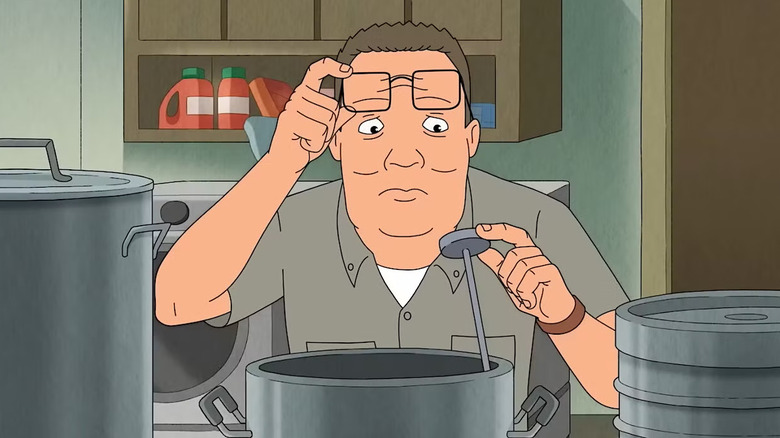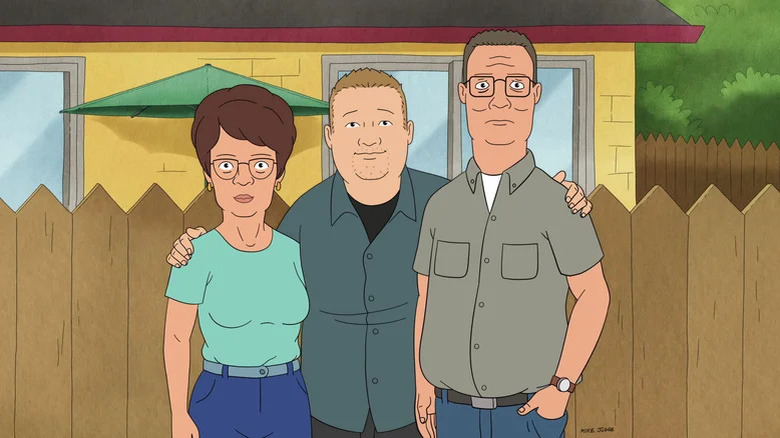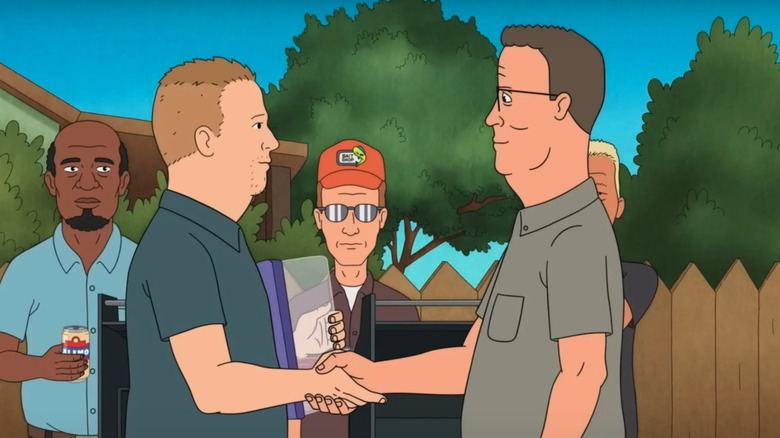Everyone's Biggest Fear About The King Of The Hill Revival Is Completely Unfounded
Before the legacy revival of "King of the Hill" hit the Hulu streaming waves, the hit animated sitcom from Mike Judge and Greg Daniels had been off the air for 15 years. Despite ending during the early years of the Obama administration, the series' themes feel strikingly relevant even today. "King of the Hill" took a satirical yet heartfelt look at American life through the lens of the Hill family; patriarch Hank Hill (voiced by Judge), a propane salesman with strong principles, lives with his multi-talented wife Peggy (Kathy Najimy), who works as a substitute teacher (among many other things), their eccentric and sensitive son Bobby (Pamela Adlon), their naïve niece Luanne (the late Brittany Murphy), and the rest of the denizens of the fictional Texas town of Arlen.
Often written off as just another show poking fun at Southern stereotypes, "King of the Hill" is much deeper than it appears. It delivers sharp social commentary on issues ranging from generational divides and shifting class structures following post-Reagan conservatism, progressive idealism, unquestioned nationalism, and systemic inequality — long before those conversations became mainstream. Unlike "The Simpsons" or "Family Guy," which took a more cartoonish approach to their storytelling, "King of the Hill" is grounded in everyday realism. At its core, the show is about Hank's internal conflict: the tension between his traditional ideals and the changing reality around him. He must grapple with the idea that real contentment might only come if he's willing to let go of what he thought America should be. His neighbors and friends are caught in similar struggles, clinging to their own versions of the American Dream, with many of them unwilling or unable to adapt to a shifting cultural landscape.
With the show returning during a time when reality feels beyond satire and animated political commentary earns you a scolding from the White House (as we only just saw with the "South Park" season 27 premiere), can a series centered on a lovable conservative exist in the current cultural climate? Fortunately, the answer is a resounding, "Ho, yeah!"
Hank Hill has always been a Trojan Horse for bettering oneself
Hank Hill is often incorrectly cited as a "fictional character who would have voted for Trump" (he would never vote for a New Yorker, you clowns), because "King of the Hill" is arguably one of the most misunderstood shows in history. Hank might come off as headstrong and overly sure of himself, but beneath that tough exterior, keeping his emotions trapped inside like a vault, he's always re-evaluating what he thinks he knows. He's an old hound like Ladybird (RIP queen) who can pick up new tricks, even if he swears he's seen it all.
Blue jeans, back-alley beers, and a healthy respect for propane meant Hank Hill spoke to the good ol' boys in a language they understood, allowing the series to be a Trojan Horse for progressive messaging. They saw themselves in his stiff-upper-lip patriotism and his readiness to "kick ass" when the situation called for it (and sometimes when it didn't), and they stuck around for the perfectly grilled medium-rare steaks but ended up getting something deeper: a show that skewered every corner of American life and quietly suggested that being a "real man" might mean outgrowing the clichés.
With this still at the heart of the "King of the Hill" revival, the fears that a character like Hank Hill can't be enjoyed all these years later are completely unfounded. Sure, there are some clunky moments in the early episodes to help get the show up to speed with the cultural shifts that have happened since we last saw its characters (Hank saying "nepo baby" is cursed, actually), but Hank's politics resemble the majority of the Bush-era conservatives who escaped the Fox News or QAnon brainwashing that happened during the quarantine era of the pandemic. He might not understand all-gender bathrooms, but he has zero patience for manosphere losers who idolize figures like Andrew Tate (an issue "Adolescence" touched upon to chilling effect earlier this year). He still gets a little choked up at the idea of getting to roleplay as George W. Bush, but Hank wouldn't have been caught anywhere near the Capitol on January 6th. Dale Gribble (who Toby Huss is now voicing in the wake of Johnny Hardwick's passing), however, that's another story...
It's Bobby's time to become the man who learns
The original run of "King of the Hill" used Bobby Hill as the source of most of Hank and Peggy's realizations that they needed to expand their worldviews of a changing society, as he was proof that a person existing differently and loving them with all of your heart are not mutually exclusive. The revival still shows Hank and Peggy adapting to our changing world (Peggy's hatred of neighborhood watch apps like NextDoor is particularly refreshing), but rather than locking the focus on the Hill parents, Bobby also has some things to learn about the world. Instead of going to college, Bobby pursued his passion for cooking by becoming the head chef at Robata Chane, a Japanese-German fusion restaurant owned by the Wassanasong family. Although he lives in an apartment with his longtime best friend Joseph Gribble (now voiced by Tai Leclaire), Bobby is a little socially stunted compared to people his own age.
He has to learn about the normalization of ethical non-monogamy, the existential fears that sink in once you reach the age where many of your friends' parents (who are the same age as your parents) start dying, friends (and enemies) weaponizing therapy language, and whether or not a lifelong meat-eater can make it work with a vegan. Of course, Bobby is quicker to embrace our changing world than his ol' man is, but watching him realize how much he has to learn about life is a refreshing reminder that even progressive-thinking pillars of non-toxic masculinity like Bobby Hill are still just human beings trying their best. And that's exactly what "King of the Hill" has always been trying to preach. It's not a pro-conservative show or even a series that tries to let conservatives off the hook; it's one that wants to remind us we're all on a not-always-easy journey making our way through life, and we've all got something to learn.
The revival doesn't reinvent "King of the Hill" — it proves it never really needed to be reinvented. It just needed to rejoin us in 2025.
"King of the Hill" is now streaming on Hulu.


